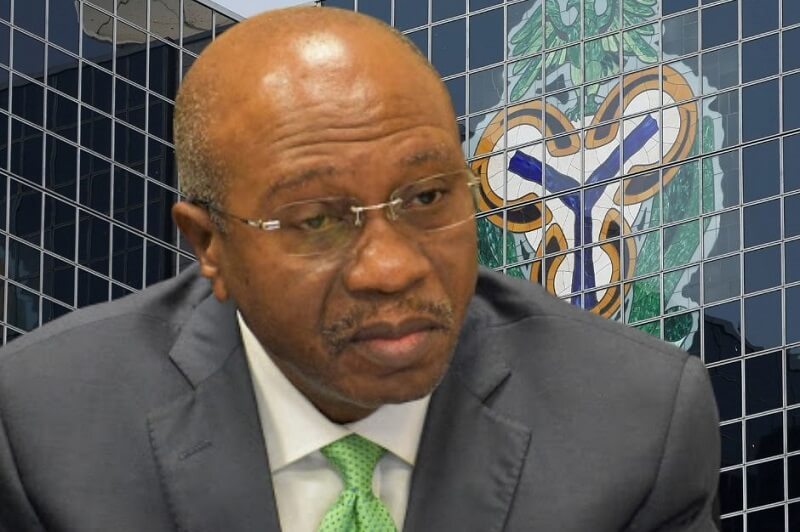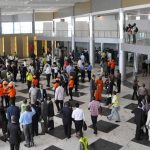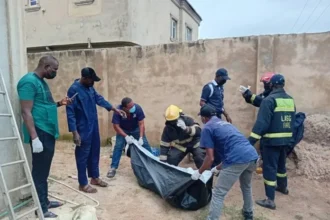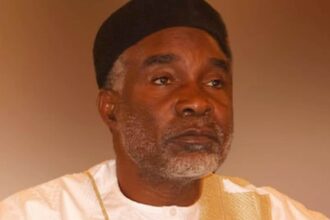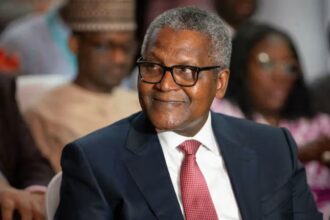...To get all news updates, Join our WhatsApp Group (Click Here)
Also Join our WhatsApp Channel (Click Here)
The Special Investigator probing the Central Bank of Nigeria (CBN), Jim Obazee, has discovered 593 bank accounts located in the United States, United Kingdom and China in which the Central Bank of Nigeria (CBN), under Godwin Emefiele, kept Nigerian funds without authorisation by the Board and Investment Committee of the bank.
The investigator also discovered how billions of naira were allegedly stolen by Mr Emefiele and other officials from the CBN’s accounts including a “fraudulent cash withdrawal of $6.23 million” – about N2.9 billion at the then official exchange rate of N461 to a dollar.
Mr Obazee disclosed these in his report in which he recommended the prosecution of Mr Emefiele and at least 13 other individuals, including his deputy governors, for alleged gross financial offences.
In the UK alone, the Special Investigator said his probe led him to 543.4 million Pounds kept by Mr Emefiele in fixed deposit accounts. He also said Mr Emefiele manipulated the Naira exchange rate and perpetrated fraud in the e-Naira project of the CBN.
In his report, which he submitted to President Bola Tinubu on 9 December, a copy of which was seen by PREMIUM TIMES, Mr Obazee identified several “chargeable offences” for which the former CBN governor may be asked to defend himself before a court.
President Bola Tinubu had on 28 July appointed Mr Obazee as a Special Investigator to investigate the CBN and related entities, charging him to set up a suitably experienced and competent team and to work with relevant security and anti-corruption agencies for the assignment.
Mr Tinubu said the appointment relied on the fundamental objective outlined in Section 15(5) of the Nigerian constitution and was in furtherance of the country’s anti-corruption fight.
The president had also directed Mr Obazee, who was the chief executive officer of the Financial Reporting Council of Nigeria (FRCN) between 2011 and 2017, to take immediate steps to ensure the strengthening and probity of key Government Business Entities (GBEs) and block leakages in the CBN and related GBEs.
He also directed him to provide a comprehensive report on public wealth currently in the hands of corrupt individuals and establishments (whether private or public).
Naira redesign “fraud”
According to the report of the Special Investigator, the highly controversial redesign of the Naira in October 2022 “was neither recommended by the Board of the CBN nor approved by the then President, Muhammadu Buhari, contrary to the provisions of Section 19 (1) of the CBN Act, 2007,
“It was a conspiracy against the Nigerian people and specifically the political class by the then CBN Governor (Mr Godwin Emefiele) and one of the erstwhile CBN Deputy Governor (Mr Folashodun Shonubi). The idea was that of Mr Shonubi (claiming interwoven challenges) and Mr Godwin Emefiele designed and approved the currency on 19th October 2022.
“It was indeed meant to frustrate the political class and make their election agenda very difficult. It turned out to be a huge punishment to Nigerians and the Nigerian Economy coincidentally.”
Mr Obazee said the CBN printed the new N200, N500 and N1000 notes at a total cost of N61.5 billion, out of which it has paid N31.8 billion to the contractor, even though the total value of the new notes in circulation as of August was only N769,562 billion.
“The sum of N1,727,500,000 was also spent on questionable legal fees on 19 cases that are directly traceable to the Naira Redesign and reconfiguration agenda,” Mr Obazee said in the report.
Stating the timeline of how the decision to redesign the naira was conceived and executed, Mr Obazee said the immediate past Director of Currency in the CBN, Ahmed Umar, who was under the supervision of Mr Folashodun, wrote a memorandum on 25 August 2022, to the committee of Governors (CBN), advising the redesign of the currency.
The next month, Mr Emefiele claimed that a presidential aide, Tunde Sabiu, told him during a visit to the Presidential Villa to consider redesigning the naira, and on 6 October, the CBN governor wrote President Buhari seeking approval for the exercise.
“Mr Emefiele did not consult with the management of the CBN nor seek any recommendation from the Board of the CBN as required by Section 19 of the CBN Act, 2007,” the report said.
However, on the same 6th October 2022, Mr Buhari approved the request but directed that the notes be printed locally. However, after the Nigerian Security Printing and Minting Plc said it would be time-consuming to redesign and reconfigure the notes because of the new features contained in the design – positioning of watermark, presence of QR codes, different numbering style and other complex security features – Mr Emefiele took the job to the UK firm, which varied the colours of the old notes and got paid 205,000 British Pounds for the “redesign effort.”
Other “chargeable offences”
The Special Investigator also identified other offences, including fraudulent use of Ways and Means to the tune of N26.627 trillion; fraudulent intervention programmes, fraudulent expenditures on COVID-19, and misrepresentation of presidential approval on the NESI Stabilisation Strategy Ltd.
On the “fraudulent use of “Ways and Means”, he reported:
“Section 38 of the CBN Act, 2007 allows the CBN to grant temporary advances to the Federal Government in respect of temporary deficiency of budget revenue at an interest. This is what is commonly referred to as “Ways and Means”. The said Section also provides that such advance is to be repaid by the end of the Federal Government financial year in which they are granted, otherwise the CBN shall be stopped from granting such advances in subsequent years. The advance is never to be repaid by way of Promissory note, Securitisation nor issuance of Treasury Bills; etc.
“It was a surprise, Mr President, that under the last administration, the noble outlet became a huge source of fraudulent drain pipe for the then Minister of Finance, Mrs Zainab Ahmed, the erstwhile CBN Governor, all the four deputy CBN Governors (under the guise of COG), the Permanent Secretary of the Ministry of Finance, the Accountant General of the Federation and even the then Chief of Staff, In an instance, they padded what the former President Muhammadu Buhari approved with N198,963,162,187 (approximating an approval of N801,036,937,813 to N1 trillion).
“There are instances where no approvals are received from the former President Muhammadu Buhari and yet, N500 billion is taken and debited to Ways and Means.
“There are more shocking instances when the erstwhile CBN Governor and his four deputy Governors connived to steal outrightly in order to balance the books of the CBN. This was by violently taken (sic) money from the Consolidated Revenue Fund (CRF) account and then charged it to “Ways and Means,” They even created the narration as Presidential subsidy and expanded the “Ways and Means” portfolio to accommodate the crime.
“The CBN officers and even the then Acting CBN Governor could not produce the Presidential Approval of most of the expenses described as “Ways and Means”. When confronted to provide the breakdown of the supposed N22,719,703,774,306.90 that was presented to the 9th National Assembly to illegally securitise the “Ways and Means” financing, they were only able to partially explain a total of N9,063,286,720,318.92 or N9,258,040,720,318.92 (depending on which official you are considering his submission) and an unreasonable attribution of non-negotiated/unadvised interest element of N6,678,874,321,541,97. This shows that this was the point where the officers of the immediate past administration as well as the erstwhile CBN Governor and his four Deputy Governors connived, defrauded and stole from the commonwealth of the country with the aid of civil servants.
“The true position of the “Ways and Means” as documented from the reconciliation between the CBN and the Ministry of Finance at the time, is N4,449,149,411,584.54.”
$6.23 million foreign election observation missions
The Special Investigator also reported his discovery of the theft of $6.23 million from the vault of the CBN between 7 and 8 February this year, about two weeks before the presidential and National Assembly polls, under a purported approval of the president for the release of money to pay foreign election observers.
The removal of the money from the vault of the Foreign Payment Office, Abuja Branch, of the CBN, which was captured on CCTV footage, followed a trail of letters which began with one dated 23 January 2023 with the caption “Presidential Directive on Foreign Election Observer Misions” (sic). The heist was completed when an official in the office, Uzero Oghenefego, “took steps, procured the dollar cash, and released same to persons yet to be fully identified.”
“As at date, Abdulwaheed Muhammed has admitted in a written statement that he acted in collaboration with one Bashirdeen Mohammed Maisanu, an assistant director in the Banking Supervision Department of the Central Bank of Nigeria and some persons he is yet to identify, to conceive and carry out the act of stealing the sum of $6.23 million out of the vault of the Central Bank of Nigeria.
“A fraudulent cash withdrawal of $6.23 million perpetrated since February 8th 2023, was not discovered nor taken seriously till the 4th of December when a Request for Information was issued by the Office of the Special Investigator. There is therefore an appearance of concealment by officers …”, the report stated.
President Tinubu was said to have requested the Special Investigator to submit the report by the first week of December so as not to delay his plans for the reform of the CBN and related agencies. When PREMIUM TIMES contacted his media aides on Thursday, they confirmed that Mr Obazee had turned in his report but that the president had yet to communicate his decisions on it to his officials or the CBN.
Mr Emefiele and the other individuals, whose names appeared in the report, could not be reached Thursday night and Friday morning to comment for this story.
You can get every of our news as soon as they drop on WhatsApp ...To get all news updates, Join our WhatsApp Group (Click Here)
Also Join our WhatsApp Channel (Click Here)



